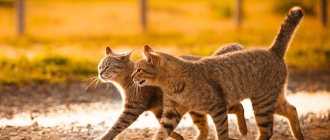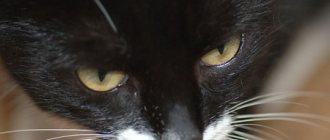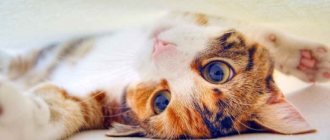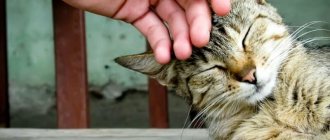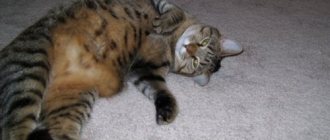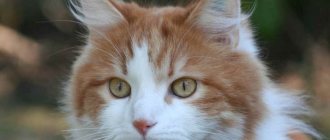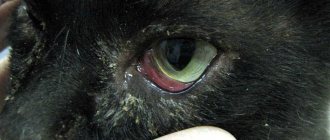In the apartment
An uncastrated cat living in an apartment causes a lot of inconvenience to its owner. If you are not going to castrate your pet, then be prepared to face problems such as:
- Tags. Most unneutered cats mark their territory in this way. This is the natural behavior of a sexually mature animal; it is useless to scold for it. Animals periodically mark the owner’s things, furniture and corners. The tags have a strong odor that is difficult to get rid of.
- Night screams. With a loud cry, the cat scares away rivals from the house and at the same time notifies the females of its presence.
- Aggression. With the onset of puberty, a previously affectionate, playful kitten can become an aggressive male. This is due to the action of testosterone, which encourages the cat to strive for leadership and conquer territory.
What happens if the gonads are not removed?
If the animal's reproductive glands are not removed at a young age, the owner will face a not very happy future. After puberty, an adult cat will begin to mark its territory; the unbearable stench and sticky puddles will become a permanent “decoration” of the apartment.
At the beginning of spring, the owner will be forced to listen to loud cat “arias” in the evenings, as the animals search for a female for mating. The male will become aggressive, begin to attack the owners, shit in inappropriate places, and ask to go outside.
Be sure to read:
Castration of a cat: how it happens: how it is done, methods, what is removed and at what age
The pet will try to leave the apartment to go in search of a “soul mate,” and finding him on the street will not be so easy. A pet, accustomed to constant care from people, may die on the street.
Hormonal drugs
There are many special drugs designed to suppress sexual desire in cats. They are available in the form of drops, tablets or injections.
Hormonal drugs, including “Sex Barrier”, “Contrasex”, “Nonoestron”, “Stop-Intim” and others, are often used by owners of uncastrated cats, allowing them to temporarily reduce the troubles that their behavior causes.
A significant disadvantage of hormonal drugs is the enormous harm they cause to the health of the animal. Frequent use can lead to consequences such as diabetes, cancer and other diseases.
In case of emergency, veterinarians recommend using natural-based sedatives, such as “Cat Bayun” and “Stop-stress”. They are not as effective as hormonal ones, but they do not harm the health of the animal.
Is surgery necessary if the cat does not go outside?
Sterilization of non-outdoor animals is mandatory in many countries. It is domestic cats that most often cause the maximum amount of trouble to their owners. The male, who periodically visits the street, marks the territory there, mates, and returns to the house to eat and sleep.
The pet is deprived of such “joys”, which means it will create all the disgrace in the apartment. Removal of the gonads is the only option for owners of adult cats.
If the cat walks alone
Owners of unneutered cats who let them outside feel like they are doing a good deed by letting their pet run around and socialize with other cats.
Such people forget about the many dangers that await a cat on the street:
- cars that can seriously injure or kill an unwary cat;
- flayers and simply cruel people who can kick a pet;
- scattered poisoned dog food that a cat might try;
- various infections, including those dangerous to people;
- hungry packs of dogs;
- fights with other cats, in which the animal may lose an ear or an eye.
In addition, most owners do not want to think about the fact that free-ranging pets reproduce uncontrollably.
Cat owners do not feel involved in the increase in stray animals, because all problems with kittens lie with cat owners, who either get rid of the kittens right away, or let them grow up and throw them away. This exacerbates the problem of homeless animals, and all animal owners who allow animals to roam are guilty of it.
What is cat castration
Castration of a cat is a surgical procedure that is performed only under anesthesia. During this procedure, a veterinarian removes the animal's testicles through incisions in the scrotum area. After this, the body stops producing sex hormones, and the cat completely loses interest and ability to reproduce.
Note! Sometimes castration is a necessary condition. It is necessary to castrate a domestic cat if there are tumor processes or traumatic injuries to the genital organs.
It is recommended to castrate cats that have no contraindications, as well as non-pedigreed animals, at the age of 8 months to a year. During this period, the process of formation of the skeleton and muscles ends, and basically the genitals are already formed.
But it is worth considering that there are some contraindications for this surgical intervention:
- Castration of a cat should not be performed if the animal has heart and vascular diseases. The fact is that anesthesia can cause serious health problems, and can sometimes lead to death;
- It is not recommended to perform surgery on cats in old age. The older the animal, the higher the risk of developing serious complications after surgery;
- Animals included in exhibition classes, as well as cat breeds intended for breeding, are not castrated.
Diseases
Unneutered cats are susceptible to the following diseases:
- Prostatitis is an inflammation of the prostate gland that occurs due to the penetration of pathogenic microorganisms into the prostate tissue.
- Diseases of the urinary system. Among them: urolithiasis;
- urocystitis (inflammation of the bladder);
- nephrosis;
- nephritis;
- pyelonephritis.
Castration will greatly reduce the risk of these diseases.
Thus, surgery is the safest and most humane way to solve all problems associated with cat behavior.
Optimal age for surgery
Veterinarians recommend surgery within a period of eight months to one and a half years.
The time period is the most optimal, because by this time the male:
- The skeleton and internal organs are fully formed.
- Puberty ends.
- A young body can tolerate anesthesia without problems.
- The risk of complications is minimized.
It is not worth castration earlier due to the fact that the animal’s body is intensively developing, and removal of the seminal glands will stop the development of internal organs and will negatively affect the overall development of the animal.
When should the operation be performed? Consequences
It is better to carry out the castration procedure before the cat has time to mate. Otherwise, it will also follow the “call of nature,” and the pituitary gland will continue to produce the appropriate hormones. When choosing a place for manipulation, preference should be given to a veterinary hospital, where castrations are carried out daily and special conditions are observed.
The owner should have the opportunity to stay with his pet after the operation. Tips before and after castration are as follows. Prepare the animal before the intervention: feed at least 12 hours before, water, but less than 3 hours before). Before anesthesia, you need to calm your pet and relax him as much as possible.
After surgery, provide warm and soft bedding to restore strength after a stressful period. Many cats begin to lick the seams, it is necessary to provide them with pants (some use a baby diaper, cut out a place for the tail, use a bandage). According to the veterinarian’s recommendations, the intervention site should be treated at home or in a clinical setting for the first time. If the temperature rises, be sure to consult a specialist.
Often castration is accompanied by the further use of dietary food, which is washed down with plenty of fresh and clean water. Homemade food is never mixed with factory food; the choice is made in favor of the latter. There are types of food recommended specifically for castrated or sterilized animals, every well-known manufacturer takes care of them - Proplan, Royal Canin and others.
The consequences of the intervention may be different, the pet’s behavior may be unpredictable. Some animals take a long time to recover and experience psychological discomfort. Others return to their normal lifestyle almost the next day.
There are opinions that a neutered cat is unhappy due to the lack of sexual desire, he is not accepted in cat society, and is driven out of the territory. The views of zoo doctors are unequivocal: prohibit non-neutered cats from walking. The problem of stress in mature cats is loss of territory, fighting for females, injury, and associated diseases. Mating is generally fraught with infections, STDs and parasitic infestations. What about the fate of hundreds of hungry and homeless kittens? All because of the support in his male cat of a social status, which he will lose after castration and which is not important for him.
Castration, pros and cons. Arguments for and against castration of cats.
The benefits of neutering - why we neuter male cats.
There are many reasons why veterinarians and animal welfare societies recommend neutering adult male cats. Many of these reasons are listed below, but this list is by no means exhaustive.
Prevention of unwanted offspring:
Very often, small kittens end up in pet shelters. Pet overpopulation and the abandonment of unwanted kittens (and puppies) are an all-too-common side effect of irresponsible pet ownership. Every year, thousands of unwanted kittens and adult cats are surrendered to shelters or thrown into the streets (stray animals ultimately die from starvation or disease). Many of these animals never end up in good hands to care for them. This sad fate can be avoided by many pets by not allowing domestic cats to breed indiscriminately, and one way to prevent accidental, unwanted breeding is by routine neutering of all non-breeding male cats (and female cats too, but that's another page).
Note: Intentional pet breeding should never be seen as an easy way to make quick money. A lot of expense, effort and experience goes into producing quality litter for a profitable sale. And this is only if nothing happens! If your kitty needs a cesarean section at 1 a.m. or develops a severe infection (eg, pyometra, mastitis), then all your large projected gains will quickly turn into financial losses (veterinarian fees for these treatments are high). Additionally, if you don't do your homework and breed poor quality and poorly socialized kittens that don't sell well, then you are simply dooming some of these young animals to a miserable life if they end up in shelters or on the street.
Reducing the number of stray and feral cats:
Domestic cats that are neutered at a young age cannot go outside and mate with feral or stray cats. This benefits the cat population, as fewer stray and feral cats (who lead a hard life as strays) are born, as well as the community and environment at large. Feral and stray cat populations pose a significant predation risk to native wildlife; they carry infections that can affect humans (eg, rabies, helminthic infestations) and domestic animals (eg, rabies, parasites); they fight with domestic animals, infecting them with unpleasant bacterial infections, abscesses form in the animals; they steal pet food and place a huge financial and emotional burden on shelters and animal rescue groups.
Reducing the spread of defective genetic traits, genetic diseases and congenital deformities:
Cat breeding is not just about producing kittens, it is about passing on genes and genetic traits from one generation to the next within the breed population. Pet owners and breeders should neuter cats that have morphological, color or temperamental traits that are unfavorable or defective for the breed as a whole, to reduce the spread of these defects through generations. Male cats with inherited genetic diseases and birth defects/deformities should also be neutered to reduce the spread of these genetic diseases to their offspring.
Some examples of proven hereditary or potentially dangerous hereditary diseases that are a contraindication to neutering in cats include: polycystic kidney disease (ADPKD), lysosomal storage diseases, and amyloidosis. There are also many others.
Prevention or reduction of testicular (and epididymal) diseases:
It's hard to get testicular disease if you don't have testicles. Early neutering prevents male cats from contracting a range of testicular diseases and disorders, including testicular cancer, adnexal cancer, orchitis (inflammation of the testicles with or without infection), epididymitis, testicular torsion, testicular abscess and testicular trauma.
Note: Although testicular and epididymal cancer can occur in cats and is prevented by neutering, it is not nearly as common in unspayed male cats as it is in unspayed male cats.
Preventing or reducing testosterone-related diseases:
It is well known that unneutered dogs can suffer from a number of diseases and medical conditions that are directly related to high levels of testosterone in the blood. These diseases include: benign prostatic hyperplasia (BPH), prostatitis, prostate abscesses, perianal or perineal adenomas (small cancers that arise around the anus of uncastrated male dogs), perineal hernias and some castration-related skin diseases (dermatoses). Neutering these dogs removes the main source of testosterone from the animal's body (testes), which not only prevents these diseases from occurring, but can even help control or treat these diseases if they are already present.
Unneutered male cats, on the other hand, very rarely suffer from testosterone-related medical conditions such as prostatitis, BPH, perianal adenoma and perineal hernia. Thus, the prevention of testosterone-related diseases should be considered a very minor reason for castrating a cat. Of course, neutering male cats will likely prevent these testosterone-mediated conditions from occurring if an individual cat happens to be prone to them: these types of conditions are simply not very common in this species. Likewise, if these disease conditions are already present, then just like spaying a male dog, spaying a male cat can help cure them.
Preventing or reducing testosterone-induced behavioral problems:
The testicles are responsible for producing testosterone, a hormone that makes male animals look and act like male animals. It is the testicles that cause male cats to exhibit the types of “masculine” testosterone-dependent behavior that is usually attributed to an uncastrated animal. Unneutered cats are likely to be more aggressive and more dominant, more prone to male-male aggression and fighting than neutered cats, etc. They will tend to exhibit sexualized behavior including: aroused interest in females of their own species; bite females on the withers (especially during estrus) and mate with females. They are more likely to exhibit undesirable male territorial behaviors, such as guarding resources (food, territory, their owners, etc.) and marking territory with urine and feces (for example, unneutered male cats tend to spray urine around the house when marking). Additionally, unspayed male animals are more likely than neutered ones to leave their yards and roam the surrounding area in search of females and trouble. Long walks are a bad habit because it exposes other animals (wildlife and other pets) and people to the risk of harm from your feline pet, and also exposes the traveling pet to all sorts of dangers, including: the possibility of being preyed upon by other animals , cruelty from people, poisoning (for example, from a snake bite) and the danger of meeting vehicles on the road. Neutering unneutered animals may reduce some of these testosterone-induced problem behaviors.
Note: Fights between cats are more common when they remain unneutered. Owners of fighting cats often spend a lot of money treating their pets for battle wounds and abscesses. Animals that fight are also more likely to become infected with the deadly feline AIDS virus (FIV), which is primarily spread between cats through fighting (bites and scratches). By reducing the hormonal drive to guard territory and females, castration reduces the frequency of fights and their secondary complications (eye injuries from claws, abscesses from cat fights, spread of FIV, etc.).
Reducing the smell of cat urine:
People with indoor cats often have to put up with urine and fecal odors coming from litter boxes just before those litter boxes are cleaned. As owners of unspayed cats can attest, the smell of urine can be very pungent and unpleasant when it comes from an unspayed cat, laden with the foul odor of pheromones (the odor is a result of testosterone and retrograde ejaculation of sperm into the bladder). Cats that have been neutered do not have such a strong urine odor, and neutering should therefore be considered as a means by which pet cat owners can reduce urine odor in the litter box.
Additionally, if your cat has a tendency to misbehave and likes to make urine marks in inappropriate places (beds and other furniture), reducing the urine odor by neutering will at least help keep your home odor-free. It is believed that neutering can eliminate cat urine markings in 87% of cats.
b. Disadvantages of neutering, why some people choose not to neuter their cats.
There are many reasons why some people, breeders and humane societies choose to oppose neutering male cats. Many of these reasons are listed below, but this list is by no means exhaustive.
Your cat may become overweight or obese:
Research has shown that neutered males require approximately 25% fewer calories to maintain a healthy body weight than non-neutered males. This occurs because a neutered animal has a lower metabolic rate than an unneutered animal (so it requires fewer calories to maintain its weight). Most owners tend to continue feeding their neutered cats the same amount of food after surgery as they did before surgery, resulting in their feline pets becoming overweight. Consequently, the myth of automatic obesity after neutering has become persistent, and as a result, many cat owners simply will not consider neutering for fear that they will gain weight and develop weight-related problems (such as diabetes).
Note: The point is that cats will not get fat simply because they have been neutered. They will only become obese if the reduction in their metabolic rate after castration is not taken into account and they are fed the same number of calories as an uncastrated animal.
Those of you who care about your finances may even be able to see the benefits of castration. A neutered cat will potentially consume less food than an unneutered cat of the same weight, so neutering your cat may well save you money in the long run.
Sterilization is equated to the loss of breeding potential and valuable genetics:
This cannot be denied. If a dog, cat, horse or other animal is the "last of its breed" (that is, the last cat in a long line of breeding cats), it is the choice of the breeder or pet owner to neuter that animal and therefore not pass on its valuable breed genetics, essentially means the end for this breeding line.
Castration of a cat with good breed characteristics, good temperament and the absence of genetically inherited defects/diseases will be considered a loss of quality for that breed as a whole.
Loss of testosterone as a result of castration can lead to incomplete development of male characteristics and decreased body muscle mass:
The testicles are responsible for producing testosterone, a hormone that makes male animals look and act like male animals. These are the testicles that contribute to the development of male, testosterone-dependent body characteristics usually attributed to an uncastrated animal. These include: increased muscle size and development, decreased body fat, development of a mature penis, development of a mature foreskin, and suppression of the development of female characteristics (breast development, milk production, etc.). Neutering, especially at an early age, can limit the development of mature male characteristics so that they remain immature in appearance and cause the neutered animal to have decreased muscle mass and strength compared to an unneutered animal of the same size.
Loss of testosterone due to castration may result in delayed growth plate closure:
Animals castrated early in life (before 12 months) tend to have delayed closure of their growth plates. Growth plates are bands of cartilage located at the ends of an animal's long bones that are responsible for the growth and elongation of bones during bone development and formation. As a result of delayed closure of the growth plate, castrated animals are often taller and longer in the limbs than uncastrated males. Whether this increase in growth plate closure time or bone length should be considered a problem or a benefit really depends on the individual owner, but some people choose not to neuter animals early because of this (i.e. there is a concern that these animals may be more prone to orthopedic injuries).
Any concerns about the effects of delayed growth plate closure, although not usually a problem, can be overcome by neutering after growth plate closure.
Castration reduces a cat's desire to hunt:
Although this phenomenon has not yet been proven, many owners of mousecats (cats kept to keep rodent numbers low) will refuse to have them neutered for fear that their neutered animals will no longer have any desire to do the work required of them.
Note: It is quite possible to argue that such a cat could perform even better if he did not have hormonal impulses fueled by testosterone, distracting him from the task at hand.
Sterilization is too expensive:
The high cost of veterinary services, including neutering, is another reason why some pet owners choose not to have their pets neutered.
The cat "will no longer be a man" without his testicles:
It sounds silly, but this is a very common reason why many owners, especially male owners, do not neuter their male cats and dogs.

